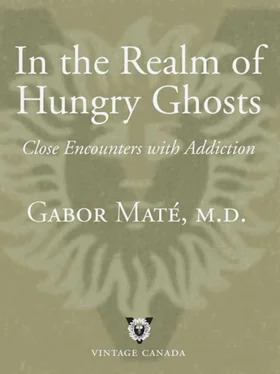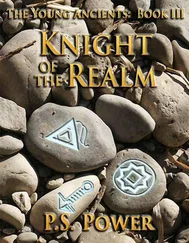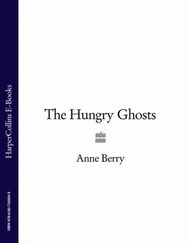The addict seldom questions the reality of the unpleasant mood or feeling she wants to escape. She rarely examines the perspective from which her mind experiences and understands the world around her and from which she hears and sees the people in her life. She is in a constant state of reactivity—not to the world so much as to her own interpretations of it. The distressing internal state is not examined: the focus is entirely on the outside: What can I receive from the world that will make me feel okay, if only for a moment? Bare attention can show her that these moods and feelings have only the meaning and power that she gives them. Eventually she will realize that there is nothing to run away from. Situations might need to be changed, but there is no internal hell that one must escape by dulling or stimulating the mind.
Addicted people often say, “I don’t know who I really am.” If the addict has more than the usual difficulty in holding on to a healthy sense of self, it’s because in the addicted brain the reaction patterns, emotions and thoughts that create a sense of self fluctuate so widely. Due to impaired regulation over easily triggered feelings of craving and distress, the addicted mind lacks consistency. The psychological oscillations and pendulum swings are greater than those that most people experience. Thought patterns and emotional states pursue each other with an exaggerated rapidity and across a broader range. It seems there is less to hold on to—in fact, the addictive behaviours and substances are one way of trying to impose some structure. Many addicts define themselves through their addictions and feel quite unmoored and lost without them. Substance-dependent people do this, but so do workaholics and other behaviour addicts. They fear giving up their addiction not only because of the temporary relief it offers, but also because they just cannot conceive who they might be without it.
Bare attention allows us to take an objective stand outside the ever-moving ebb and flow of thought, reaction and emotion and to reinforce the part of us that can observe, know and decide consciously. It allows us to observe the many individual “frames,” as it were, that make up the self-created movies in our minds.
“The key to the transformational potential of bare attention lies in the deceptively simple injunction to separate out one’s reactions from the core events themselves,” writes psychiatrist and Buddhist meditation teacher Mark Epstein.
Much of the time, it turns out, everyday minds are in a state of reactivity. We take this for granted, we do not question our automatic identifications with our reactions, and we experience ourselves at the mercy of an often hostile or frustrating outer world or an overwhelming or frightening inner one. With bare attention, we move from this automatic identification with our fear or frustration to a vantage point from which the fear or frustration are attended to with the same dispassionate interest as anything else. There is enormous freedom to be gained from such a shift. Instead of running from difficult emotions (or hanging on to enticing ones), the practitioner of bare attention becomes able to contain any reaction: making space for it, but not completely identifying with it… 15
Given that addiction is all about running from difficult emotions or hanging on to enticing ones, bare attention has the potential to dissolve the very motivations that drive the addicted mind.
The advice I will give in the next chapter about reducing stress by dealing openly with emotions may seem to conflict with the concept of bare attention, in which we notice the evanescent and shifting nature of emotions. In reality, they both come down to attending carefully to what is happening in our minds, neither suppressing our feelings nor allowing them to rule us.

As we’ve already seen, painful early experiences program both the neurophysiology of addiction and the distressing psychological states that addiction promises to relieve. Yet human beings who are able to direct conscious attention toward their mental processes discover something surprising: it’s not what happened in the past that creates our present misery but the way we have allowed past events to define how we see and experience ourselves in the present. A person can survive being beaten but cannot remain psychologically intact if he convinces himself that he was beaten because he is by nature blameworthy or because the world by its very nature is cruel. A child can overcome sexual violation, but she will be debilitated if she thinks that she somehow either deserved the abuse or brought it upon herself. She also cannot function as a self-respecting adult if she comes to believe that she is loveable or acceptable only for her sexuality. A neglected child may be helpless, but the damage comes if he acquires the defining belief that helplessness is his real and permanent state in the world. The greatest damage done by neglect, trauma or emotional loss is not the immediate pain they inflict but the long-term distortions they induce in the way a developing child will continue to interpret the world and her situation in it. All too often these ill-conditioned implicit beliefs become self-fulfilling prophecies in our lives. We create meanings from our unconscious interpretation of early events, and then we forge our present experiences from the meanings we’ve created. Unwittingly, we write the story of our future from narratives based on the past.
Although my mother likely saved my life by sending me away from the dangers of the Budapest ghetto before my first birthday, I experienced the event the only way an infant could: as abandonment. It left me with a permanent core sense that I must never be emotionally open and vulnerable. When Rae, my wife, says no to me or behaves in a way that upsets me, my automatic belief is that I’m being rejected or abandoned by the woman whose love I need, and my mechanical reaction is to detach emotionally, to withdraw. This is a common response of young children who experience emotional or physical separation from their parents. Addiction confers invulnerability because it allows us to soothe vulnerable emotions like pain or fear or the aching for love with behaviours, objects or substances whenever we choose. It’s a way to avoid intimacy. Mindful awareness can bring into consciousness those hidden, past-based perspectives so that they no longer frame our worldview. “Choice begins the moment you disidentify from the mind and its conditioned patterns, the moment you become present,” writes Eckhart Tolle. “Until you reach that point, you are unconscious.” Once I notice my programmed, defensive impulse to withdraw from intimacy and understand its source, I have some choice whether or not to act it out. With even a modicum of sanity, why would I? In present awareness we are liberated from the past.
“Your worst enemy cannot hurt you as much as your own thoughts, when you haven’t mastered them,” said the Buddha. “But once mastered, no one can help you as much—not even your father and your mother.”
I don’t propose meditation and mindfulness as panaceas. It is futile to dream of corralling a group of active cocaine addicts or alcoholics into a meditation class. To pursue such practices, one requires mental resources, a commitment to emotional clarity, an access to teaching and some mental space in one’s life. They are also difficult, especially at the beginning. But for people whose lives are blighted by addictions without being totally gripped by them, these practices can help light the way to wholeness.
When asked about my view of meditation my stock answer has been, “I have a profound relationship with meditation; I think about it every day.” It’s true. Every day for years I’ve heard the call of contemplative solitude, and nearly every day I’ve turned a deaf ear. I’ve run from mental discipline like Jonah escaping the call of God until he ends up in the putrid belly of the whale. My addiction-prone, ADD brain always wants to look to the outside to get away from itself. As a result, I tend to oscillate between excessive, multitasking busyness and a proclivity for “vegging out” in ways that leave me nonrested and dissatisfied. Meditation, with its demand for stillness and self-observation, has not been an activity I’ve joyfully embraced.
Читать дальше













